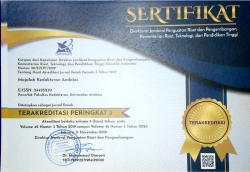Pengaruh asupan tinggi fruktosa terhadap tekanan darah
Abstract
Peningkatan jumlah konsumsi fruktosa, terutama dalam bentuk (high fructose corn syrup) HFCS, mempunyai hubungan yang erat dengan peningkatan tekanan darah. Artikel ini bertujuan untuk membahas pengaruh asupan tinggi fruktosa terhadap tekanan darah. Artikel ini ditulis berdasarkan review beberapa literatur dengan berbagai metode penelitian. Hasil penelusuran literatur didapatkan bahwa fruktosa dapat meningkatkan tekanan darah melalui beberapa mekanisme, meliputi peningkatan absorpsi natrium di usus halus, dan meningkatkan pembentukan asam urat, serta menstimulasi sistem saraf simpatik. Selain itu, fruktosa juga dapat meningkatkan regulasi sistem renin angiotensin yang merupakan mediator disfungsi vaskuler dan stres oksidatif. Mekanisme fruktosa dalam meningkatkan tekanan darah masih belum jelas, namun beberapa penelitian telah dilakukan untuk menggali hal tersebut.
Keywords
Full Text:
PDFReferences
WHO. Noncommunicable diseases: a major health challenge of the 21st century. World Health Statistik. 2012:[pp34-45] Available from: http://www.who.int/gho/publications/world_health_statistics/EN_WHS2012_Part2.pdf.
NCD Country Profile [database on the Internet]. 2011. Available from: http://www.who.int/nmh/countries/idn_en.pdf.
Badan Penelitian dan Pengembangan Kesehatan. Riset Kesehatan Dasar (Riskesdas) 2007. Jakarta: Kementerian Kesehatan RI; 2007.
Marriott BP, Cole N, Lee E. National Estimates of Dietary Fructose Intake Increased from 1977 to 2004 in the United States. J Nutr. 2009;139: 1228S–35S.
Chen L, Caballero B, Mitchell DC, Loria C, Lin P-H, Champagne CM, et al. Reducing Consumption of Sugar-Sweetened Beverages Is Associated With Reduced Blood Pressure: A Prospective Study Among United States Adults. Circulation. 2010;121:2398-406.
Keim NL, Levin RJ, Havel PJ. Major dietary constituents and energy needs : Carbohydrates. In: Shils ME, Shike M, Ross AC, Cabelleo B, Cousins RJ, editors. Modern Nutrition in health and disease. 10 ed 2006. p. 74-6.
Gallagher ML. The Nutrient and Their Metabolism. In: Mahan LK, Escott-Stump S, editors. Krause's Food & Nutrition Therapy. 12e ed. Canada2008. p. 42-5.
Johnson RJ, Perez-Pozo SE, Sautin YY, Manitius J, Sanchez-Lozada LG, Feig DI, et al. Hypothesis: Could Excessive Fructose Intake and Uric Acid Cause Type 2 Diabetes? Endocrine Reviews. 2009;30(1):96-116.
Brown CM, Dullo AG, Yepuri G, Montani J-P. Fructose ingestion acutely elevates blood pressure in healthy young humans. Am J Physiol Regul Integr Comp Physiol. 2008;294:730-7.
Jalal DI, Smits G, Johnson RJ, Chonchol M. Increased Fructose Associates with Elevated Blood Pressure. J Am Soc Nephrol 21. 2010;21:1-7.
Le MT, Frye RF, Rivard CJ, Cheng J, McFann KK, Segal MS, et al. Effects of high-fructose corn syrup and sucrose on the pharmacokinetics of fructose and acute metabolic and hemodynamic responses in healthy subjects. Metab Clin Experimental. 2012;61:641-51.
Dhingra R, Sullivan L, Jacques PF, Wang TJ, Fox CS, Meigs JB, et al. Soft Drink Consumption and Risk of Developing Cardiometabolic Risk Factors and the Metabolic Syndrome in Middle-Aged Adults in the Community. Circulation. 2007;116:480-8.
Sun SZ, Flickinger BD, Williamson-Hughes PS, Empie MW. Lack of association between dietary fructose and hyperuricemia risk in adults. Nutrition & metabolism. 2010;7(16):1-12.
Forman J, Chol H, Curhan G. Fructose and vitamin C intake do not influence risk for developing hypertension. J Am Soc Nephrol. 2009;20:863-71.
Lustig RH. The Fructose Epidemic. The Bariatrician. 2009:10-8.
Hosseini-Esfahani F, Bahadoran Z, Mirmiran P, Hosseinpour-Niazi S, Hosseinpanah F, Azizi F. Dietary fructose and risk of metabolic syndrome in adults: Tehran Lipid and Glucose study. Nutrition & metabolism. 2011;8(50):1-8.
Tappy L, Kim_Anne. Metabolic effects of fructose and the worldwide increase in obesity. Physiol Rev. 2010;90:23-40.
Soleimani M, Alborzi P. The Role of Salt in the Pathogenesis of Fructose-Induced Hypertension. Interl J Nephrol. 2011;2011:1-8.
Groppher SS, Smith JL, Groff JL. Carbohydrates. Advanced Nutrition and Human Metabolism. 5 ed2009.
Tasevska N, Runswick SA, McTaggart A, Bingha SA. Urinary Sucrose and Fructose as Biomarkers for Sugar Consumption. Cancer Epidemiol Biomarkers Prev. 2005;14(5):1287-94.
Teff KL, Grudziak J, Townsend RR, Dunn TN, Grant RW, Adams SH, et al. Endocrine and Metabolic Effects of Consuming Fructose- and Glucose-Sweetened Beverages with Meals in Obese Men and Women: Influence of Insulin Resistance on Plasma Triglyceride Responses. J Clin Endocrinol Metab. 2009;94(5):1562-9.
Adams SH, Stanhope KL, Grant RW, Cummings BP, Havel PJ. Metabolic and Endocrine Profiles in Response to Systemic Infusion of Fructose and Glucose in Rhesus Macaques. Endocrinol. 2008;149:3002-8.
Perez-Poso S, Schold J, Nakagawa T, Sanchez-Lozada L, Johnson R, Lillo JL. Excessive fructose intake induces the features of metabolic syndrome in healthy adult men: role of uric acid in the hypertensive response. Interl J Obes. 2009:1-8.
Barone S, Fussell SL, Singh AK, Lucas F, Xu J, Kim C, et al. Slc2a5 (Glut5) is essensial for the absorption of fructose in the intestine and generation of fructose-induced hypertension. J of Bio Chem. 2009;284:5056-66.
Nyby MD, Abedi K, Smutko V, Eslami P, Tuck ML. Vascular Angiotensin Type 1 Receptor Expression Is Associated with Vascular Dysfunction, Oxidative Stress and Inflammation in Fructose-Fed Rats. Hypertens Res. 2007;30:451-7.
Akar F, Uludag O, Aydın A, Aytekin YA, Elbeg S, Tuzcu M, et al. High-fructose corn syrup causes vascular dysfunction associated with metabolic disturbance in rats: Protective effect of resveratrol. Food and Chemical Toxicology. 2012;50:2135-41.
Chong MF-F, Fielding BA, Frayn KN. Mechanisms for the acute effect of fructose on postprandial lipemia. Am J Clin Nutr 2007. 2007;85:1511-20.
Vikrant S, Tiwari SC. Essensial Hypertension - Pathogenesis and Pathophysiology. J Indian Academy of Clin Med. 2001;2(3):141-61.
Ventura EE, Davis JN, Goran MI. Sugar Content of Popular Sweetened Beverages Based on Objective Laboratory Analysis: Focus on Fructose Content. J Obesity. 2010:1-7.
Nguyen S, Choi HK, Lustig RH, Hsu C-Y. Sugar-Sweetened Beverages, Serum Uric Acid, and Blood Pressure in Adolescents. J Pediatr. 2009;154:807-13.





















